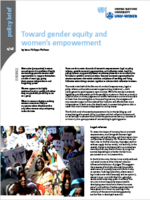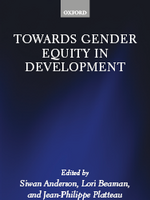Filter by...
Reset all
Publications (32)
Journal Article
– The role of financial shocks and marital customs
Part of Journal Special Issue
Women’s Work
Working Paper
pdf
We examine whether frontier rule, which disallows frontier residents from a recourse to formal institutions of conflict management and disproportionately empowers tribal elites, provides a more fragile basis for maintaining social order in the face of shocks. Combining a historical border separating...

Many displaced people around the world are in limbo—unable to return home or go anywhere else. Our surveys show that displaced people have lived in their current location for 6.9 years on average, significantly longer than the five-year threshold for what is typically considered a ‘protracted’...
Working Paper
pdf
We examine whether frontier rule, which disallows frontier residents from recourse to formal institutions of conflict management and disproportionately empowers tribal elites, provides a more fragile basis for maintaining social order in the face of shocks.Combining a historical border that...
Working Paper
pdf
– A new measure for son preference based on stated preferences and observed measures of parents' fertility decisions
Investigating preference for sons is a continuing focal area of development economics and demographic research. Son preference presents a challenge in achieving the United Nations Sustainable Development Goals of ‘no poverty’, ‘good health and wellbeing’, and ‘gender equality’ by 2030. It is thus...
Working Paper
pdf
– The role of financial shocks and marital customs
This project aims to explore the effect of wealth shocks on education and marriage for young women in Pakistan. Financial shocks are used to estimate the probability of dropping out of education and into marriage.Using the Pakistan Rural Household Panel survey for the years 2000–10, the effects of...
Working Paper
pdf
– Cash transfers and political attitudes in Pakistan
This paper studies how household-level receipts of cash transfers affect political attitudes in Pakistan. The paper exploits the locally exogenous eligibility cut-off of the flagship Benazir Income Support Programme to estimate causal effects. The main results show evidence of improved satisfaction...
Journal Special Issue
This peer-reviewed research is available free of charge. UNU-WIDER believes that research is a global public good and supports Open Access.
– Data, measurement, and trends
Inequality and social exclusion receive considerable contemporary policy attention. In the field of international development, inequality—both vertical (between individuals and households) and horizontal (between groups)—is a core concern in the 2030 Agenda for Sustainable Development. Despite...
Journal Article
This peer-reviewed research is available free of charge. UNU-WIDER believes that research is a global public good and supports Open Access.
Part of Journal Special Issue
Horizontal inequality in the Global South

– Evidence from an insurgency in India
Implementing development programmes in conflict-affected areas is crucial for conflict as well as poverty reduction. The big question is how do you carry out these programmes successfully? Are there specific conditions under which development policies are effective? What is their impact on violence...

There are three main channels of women’s empowerment: legal or policy reforms, outside economic opportunities, and collective action. Legal (or policy) reforms are generally based on statutory laws that enact rules to be followed or prohibit certain practices. External economic opportunities for...

This is an open access title available under the terms of a CC BY-NC-SA 3.0 IGO licence. It is free to read at Oxford Scholarship Online and offered as a free PDF download from OUP and selected open access locations. As a result of widespread mistreatment and overt discrimination, women in the...
Working Paper
pdf
– Evidence from rural Pakistan
We use a randomized community development programme in rural Pakistan to assess the impact of citizen engagement on public service delivery and maternal and child health outcomes. The programme had a strong focus on ensuring the participation of women. Women in the study villages had also identified...
Working Paper
pdf
– Rethinking our approach to the world’s most fragile states
Those fragile states whose stagnation is so tenacious despite generous aid programs, and substantial and costly interventions, are stuck in a ‘fragility trap.’ Caught in a low-level equilibrium, trapped states appear to be in a perpetual political and economic limbo that can last for years and in...
Displaying 16 of 32 results
 Join the network
Join the network